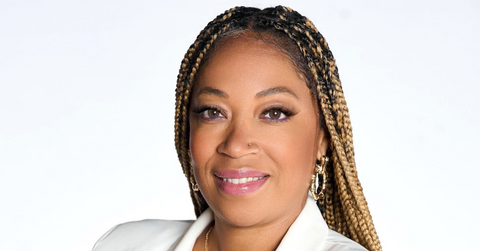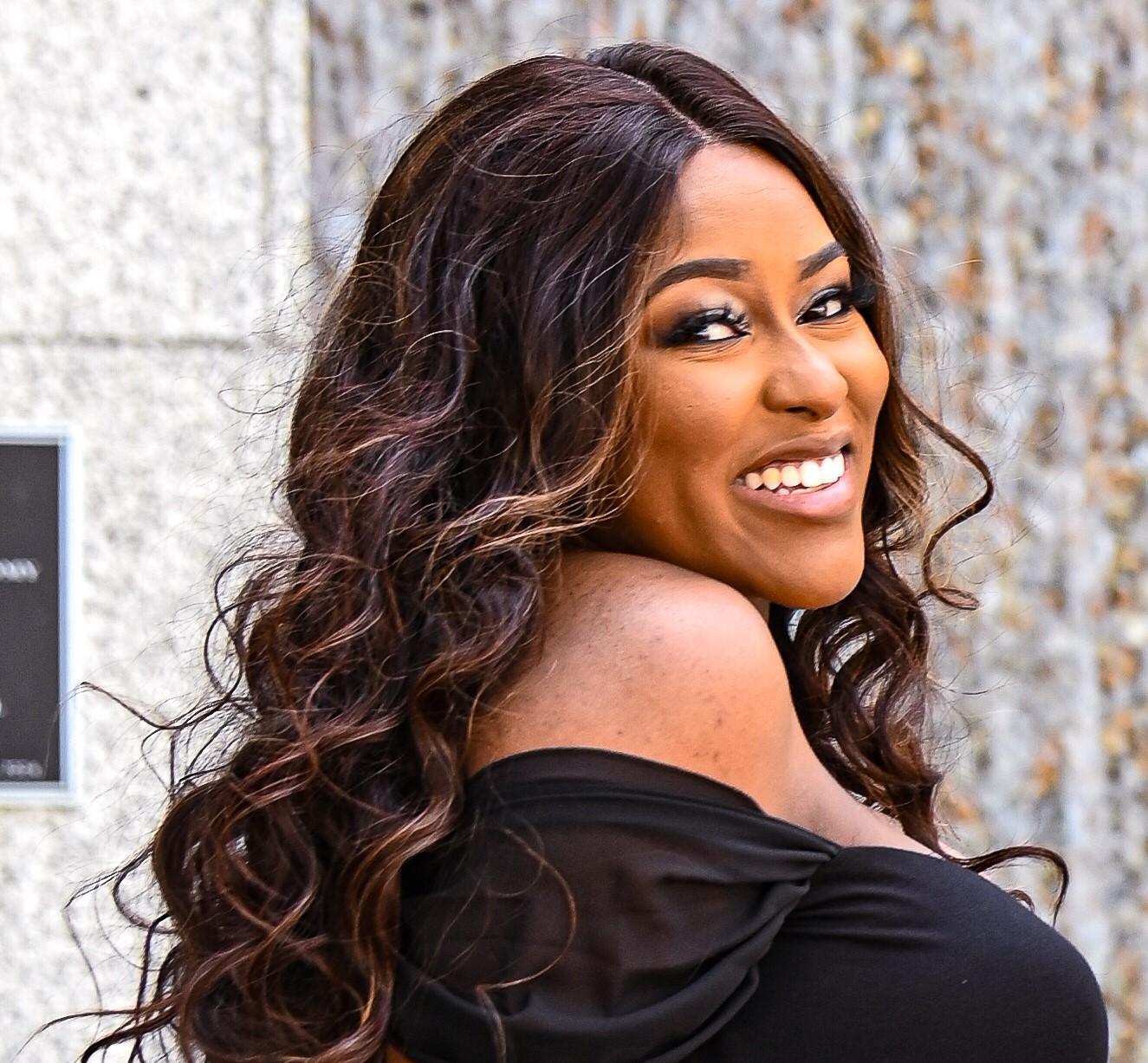Debbie Douglas may be considered ‘the talent whisperer’ but her work speaks volumes as an innovator, a champion of diversity, and a mentor in the field of human resources. Her two-decade-long journey has been a testament to resilience, adaptability, and an unwavering commitment to shaping the future of professionals. From Paramount, formerly MTV Networks, to Alloy Media + Marketing and back again, Debbie has excelled by spearheading key initiatives and redefining recruitment processes where talent meets opportunity.
For Debbie, helping professionals understand alignment is key. To share her array of experiences, Debbie wrote the ebook turned paperback ‘Now What? 12 Strategies To Landing The Career You’ll Love, Not Tolerate’ as a call to action for making a change in your career no matter where you are on the journey.
Upon the release of the paperback edition, Debbie joined #HerAgendaLive to share her career journey, game-changing tips and thoughts on the job market.
For the full video interview with Debbie Douglas watch via the video player above or click here to watch the playback of our #HerAgendaLive here for our exclusive conversation with Debbie Douglas.
Her Agenda: Tell me more about your background.
Debbie Douglas: If you want to go back I went to undergrad for social work. Everyone who knows me has heard this story that I wanted to change the world one person at a time by being a social worker until I realized in my internship, wait a minute, this is way too clinical for me. How can I pivot and find something else? After graduating with a four-year degree and having to figure it all out over again, ultimately made me move into human resources. That’s where I found HR and went to grad school for Human Resources Management and that basically started my HR career.
I started in the media industry and I’m still in the media industry. 20 plus years later, I’ve had a few different pivots as well. In a nutshell, I recruit, retain, and try to hire the best of the best in our company.
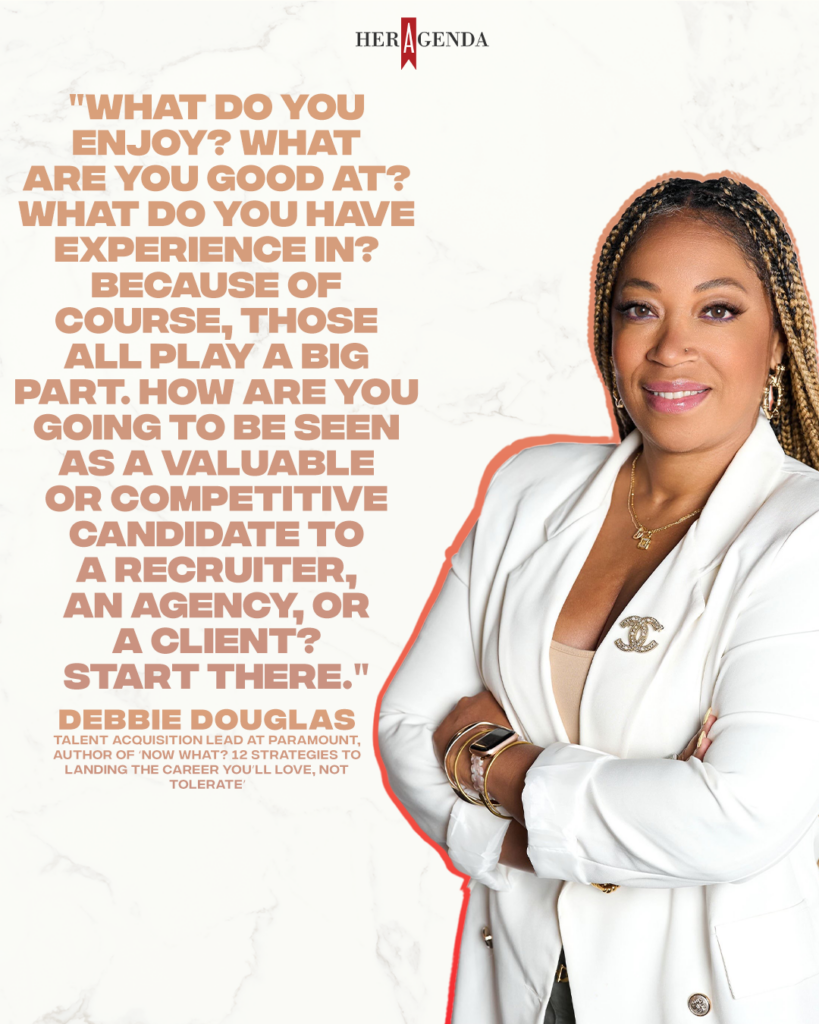
Her Agenda: One of the things that I wanted to kind of talk about was about your journey and development. How did you get the nickname of the talent whisperer?
Debbie Douglas: It came out through what I do on a day-to-day basis, which is being a talent acquisition professional. In addition to interviewing people who apply for jobs, a big part of my job is soliciting, sourcing, and wooing candidates to the jobs. We’re selling the job to a candidate. We also have to sell the candidate to the hiring manager.
We are no longer just our person, we are a brand in ourselves as well. It’s all about how you are presenting yourself. What does your personal brand say about you? What does your professional brand say about you? That’s kind of how I was coined the talent whisperer.
Her Agenda: I love it. I think that’s a good start to this conversation because one of the strategies that people have been sharing a lot over the pandemic is the importance of personal branding. We’ve hosted conversations about this and we know time and time again, people are saying you need to brand yourself. How important do you feel like branding is to the job search today? And what is a piece of unique advice that you would offer for someone outside of what we keep hearing over and over again about personal branding?
Debbie Douglas: Depending on what your digital footprint says about you on the outside, depending on how you show up in person, in rooms, that’s already stating your personal brand with you having input or not.
Then there’s a way that you can curate that a little bit and be strategic about what that brand looks like for you. For me, when I’m talking to folks or when I’m on panels or workshops or doing conferences, I always focus on, what does your digital footprint say about you? Are you okay and proud?
If an employer went to look at your social media, does it enhance your brand or does it detract from your brand? Are you confident in being okay with someone who may be looking to hire you, whether it be as an employee or even as a client. If you are an entrepreneur, what does that say about you and are you confident and okay with whatever you post to be seen by those entities? We can use our personal brand to elevate, and enhance to attract [the right opportunities].
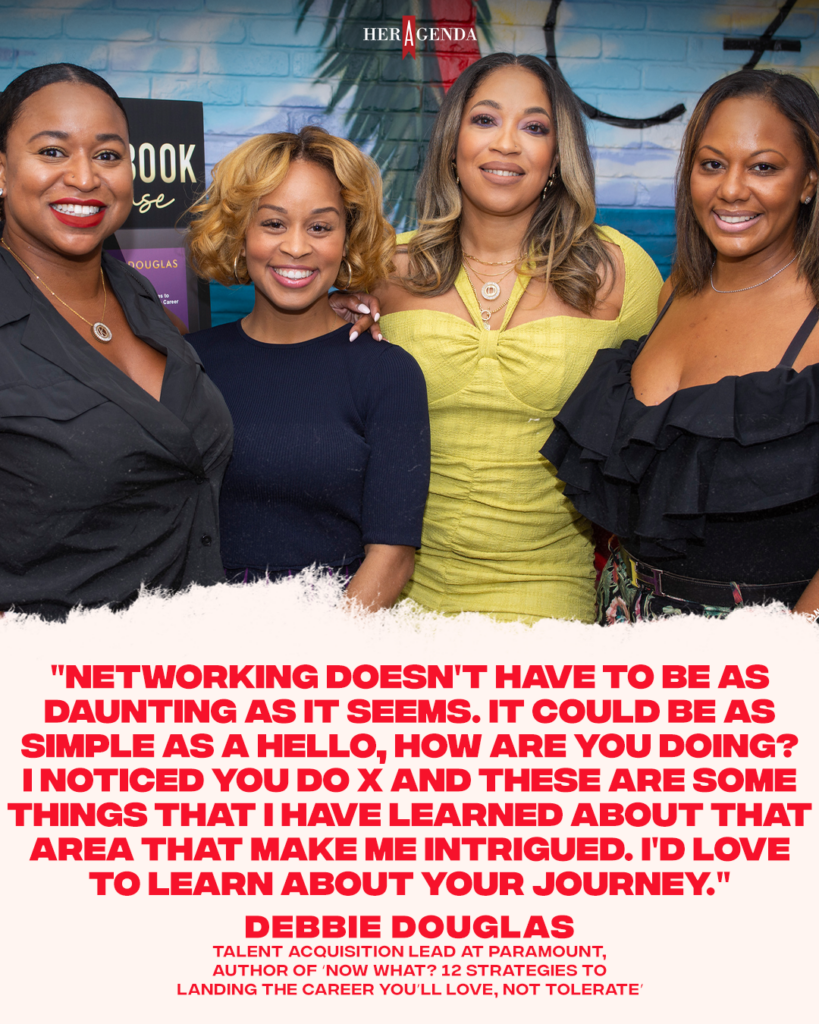
Her Agenda: One thing I was thinking about is there’s always this kind of conflict with who people are, what they want to be online, and how much they show their employers. Because people feel like, ‘well, I want to be able to be myself.’ How do you educate people, especially candidates, about how to navigate exactly how much of yourself you show?
Debbie Douglas: Oh my goodness. I love this question because I was struggling with that just a few short years ago, even before the pandemic, I was one of those people who was like, nope, if you work with me, we cannot be friends on social media. There was no blending of social and professional for me. That was just not heard of for me. However fast forward we’re in 2023 now.
We’re in a social media age and that is personal and business. People utilize these platforms to make businesses to make products to elevate people’s brands. I had to let that go. I had a personal private page at one point. I had a public professional page but someone, told me: ‘you need to be your full authentic self.’ As daunting as it seemed, I was able to put both my lives together. People want to see more than just work, work, work. They don’t have an idea of who that person is that they’re even taking advice from or someone that they may be feeling inspired by if it’s just work and all they see is static posts that are not engaging. I’m still working on this, I’m still kind of new to blending work and personal on social media. What I have learned is that it really does make a difference.
When you’re just your authentic self, you can’t pretend to be yourself but you, but it’s very, very hard to pretend to be somebody that’s that you’re not, it takes much more work than it does to do the opposite. Once I did that, it was fine. My boss follows me, and a lot of coworkers follow me now. Shout out to you guys if you are watching now.
That was very scary to me. How to find that balance is [to] be cognizant of what you’re posting obviously. I think in any format, whether you have a private or personal page, you should be cognizant of what you’re posting. Because guess what, even when you have a private page, people can screenshot, they can forward.
I personally, as a recruiter do not go out looking at people’s social media unless it’s called for. If they’re in a position where your digital social footprint is important I want to see what type of activity you’re doing on there. How are you utilizing the platform? How integral it is to your day-to-day.
But guess what? Hiring managers do that. I don’t advise them to do so, but they’re going to do it regardless, especially if you have an open page, they want to see what type of train of thought you have and things like that. People have gotten in trouble for posting things around race, sex, I mean, everything you could think of.
Find a balance of what you feel comfortable sharing and of course, some things are just for your family feel free to have a private page if you just want to share that with your family, but I think it’s good to have a balance of both professional post, as well as personal posts.
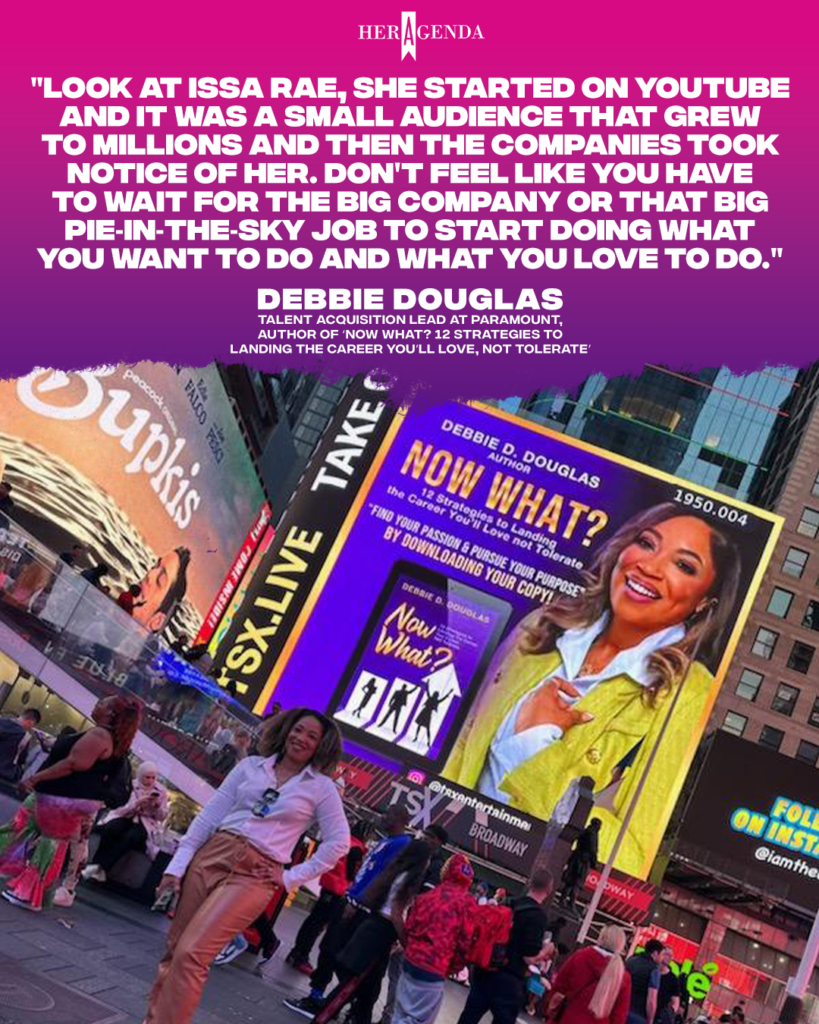
Her Agenda: That’s a really good strategy. But I question what allowed you or inspired you to really create a book around all of the different strategies that someone would need to get to a career that they would love. I think that’s such a dream for a lot of people.
Debbie Douglas: I can’t say that it was something that I was thinking about day in and day out. It was kind of during the pandemic. I did more speaking engagements. I’m a mentor.
In addition to speaking, externally, I’ve spoken at groups or my job, like our employee resource groups, our interns, and our entry-level folks, I’ve facilitated workshops for folks like nonprofits and things of that nature.
I remember one day my boyfriend was like, you are imparting so much knowledge everywhere all over the place and it’s like really great nuggets of information. You should pour that into one place where people can get all this information. In the back of my head, I had always thought about that, but the thought was quite daunting to do a book. I’m like a book, oh my God. That sounds like a whole lot of work. Because of that, I started with the ebook that came out in April and it was my way of saying I’m just going to test the waters and dip my toe into the publishing world.
At the end of the day, what I wanted was for people to get the knowledge that I share on a day-to-day basis in one book specifically because what I’m sharing in this book, is not revolutionary information, these are the basic impactful strategies that everyone should be employing.
Whether you’re an entry-level candidate, or someone who’s looking to pivot into a new career space and you’re trying to figure out how to go about that. For someone that is maybe older like a baby boomer and hasn’t been in the workforce for a while and doesn’t even know how to play in this landscape, it may be a refresher for them. These are the tips and tricks now on how to move around the career market and land the job because it’s very different from 25 years ago. When I was in college, the internet just came out. So I’m dating myself, but it’s very different when I applied for a job. When I was in college versus now in 2023 in the age of social media, in the age of people working from home, it’s just very, very different.
I just thought it would make sense. At first, I thought it was mainly going to be for those entry-level folks, but as I just stated, I realized that it could resonate with a lot of different audiences and not just your recent college grads trying to figure out and navigate their career.
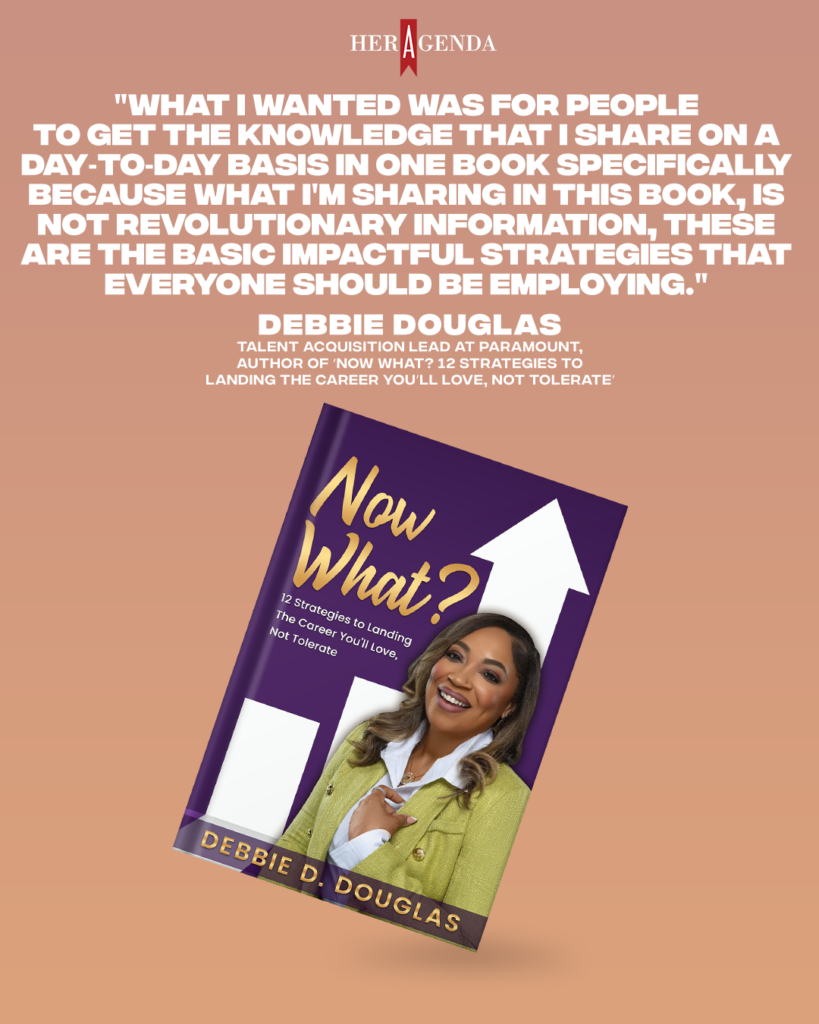
Her Agenda: I’m kind of jumping around a bit, but I see on your bookshelf you have the book, You Are A Bad Ass, which is one of my favorite books. What resources, if any, helped you hone in and develop what it was that you wanted to say? I feel like that book is very practical and just like trying to get you from point A to point B. That’s why I love it so much. Do you feel like other resources inspired you as you were writing your book?
Debbie Douglas: Outside of the fact that I’m in the world of recruiting, I’ve been a talent and recruiting director, for over 20 plus years.
A lot of the things just came naturally from my normal knowledge of recruiting and what recruiters look for in candidates and what candidates should be doing and how they should be navigating the interview process. It came from my day-to-day knowledge of the industry, in terms of the job market and things of that nature, but I also leaned on looking at, externally, what is happening in the job market, what are people asking more [about]? This information is all over, but just putting it all in one concise, little easy read. I thought it would make a lot of sense.
Her Agenda: I always wonder about that because sometimes when people want to write something, they don’t want to lean too much into somebody else’s words and then I talk to people on the equal and opposite side where they’ve consumed a lot of information before they wrote it and they just didn’t know where to start, especially depending on if you like writing or not. I feel like writing a book is a task.
Debbie Douglas: Exactly. This was my first foray and I’m sure maybe I could tapped into even more resources. I mean, I literally opened up a Canva account and just started writing. It was kind of wild.
I did add some resources in there like the Occupational Outlook campus, which still exists, is what I used to kind of help me figure out a career once I realized that [my] four year degree for social work was not going to do anything for me.
I had to find something completely different. Nowadays the tools like Fishbowl and Glassdoor to do research on companies — we didn’t have any of those resources back in the day. We just had to wing it and hope that the company was great for us. Now, we have all these tools and resources at our fingertips and it’s much easier than you would think to vet a company.
A candidate should be vetting a company just as much as the employer is vetting the candidate because we have to make sure it’s a good fit for us. Values wise. Is it a diverse and inclusive organization? Is the content of my work going to be challenging for me? Are the people and the industry representative of the type of environment I want to be in?
I always tell people, I don’t want to have Monday blues. I know sometimes we have them but I have very few Monday blues and that’s very hard to get. There are not many people that I hear saying I don’t have Monday blues. Most people Sunday night, [their] stomach is rumbling and they’re getting that anxiousness about going back to work and I don’t want that for anyone. If I can mitigate those issues for people in advance and set them up to find the position that is going to unleash their passion and their purpose [that is ideal].
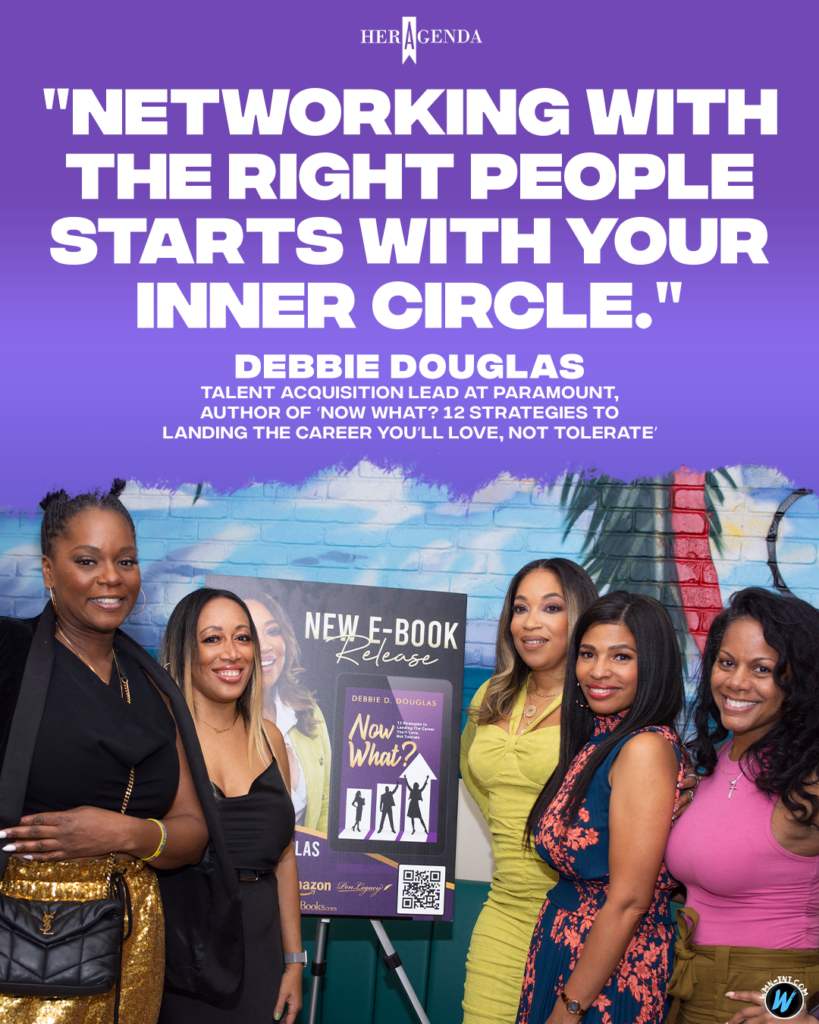
Her Agenda: Something else that you mentioned just has to do with the job market and it being so different. In the last three years, we noticed a shift in the marketplace. At one point in time, it felt like candidates had the advantage and now it feels the opposite where employers have the advantage. And because of that environment, it’s been hard for people to find a career they love because a lot of people are just like, I need to take what’s available to me. I have to pay bills. Talk about how you transition to really finding something that you’ll love, in a market like this where I feel like it’s just like jobs are not available.
Debbie Douglas: I think you gotta start with the main ingredient, which is you, what do you enjoy? What are you good at? What do you have experience in? Because of course, those all play a big part. How are you going to be seen as a valuable or competitive candidate to a recruiter, an agency, or a client? Start there.
Then you want to look at a short list of the types of companies or the industry that excites you that you’re interested in. Then you want to start to curate, doing some research on those companies because sometimes you may be very interested in a particular company and you’re like, oh, my God, look at all this bad press. They just got sued by this employee for not treating their employees right or discrimination.
It only takes a few minutes or a couple of hours to do some research, that’s the most critical thing, know about the company. And again, going back to your question, sometimes you may not be doing the things that you’re most excited about because the opportunities may be limited, you may not see as many jobs in that particular area. But there are also ways that you can make sure that you’re still staying relevant in the space, you’re cultivating your tool kit and you’re adding tools to your tool kit while you’re waiting for that next opportunity.
Your first job or your second job may not be the job, but it’s going to help you and you’re going to take all the nuggets that you got from that job and utilize it in the next job that may be your dream job. I always say don’t take for granted the little experience that you get in an assistant job. Some people graduate out of college and they’re reaching for the stars and the moon. And it’s like, hey, it’s ok to start from the bottom because that’s how you learn the foundation of the company, the role, the department. Now you can become a subject matter expert in that particular area and then build off that particular skill or pivot into a neighboring department because you have marketing skills now and you can understand what it takes to be in sales or vice versa.
If you’re a producer or a production person or someone that’s in the creative world, work with your other creative friends and create your own content and put that out there. Look at Issa Rae, she started on YouTube and it was a small audience that grew to millions and then the companies took notice of her. Don’t feel like you have to wait for the big company or that big pie-in-the-sky job to start doing what you want to do and what you love to do.
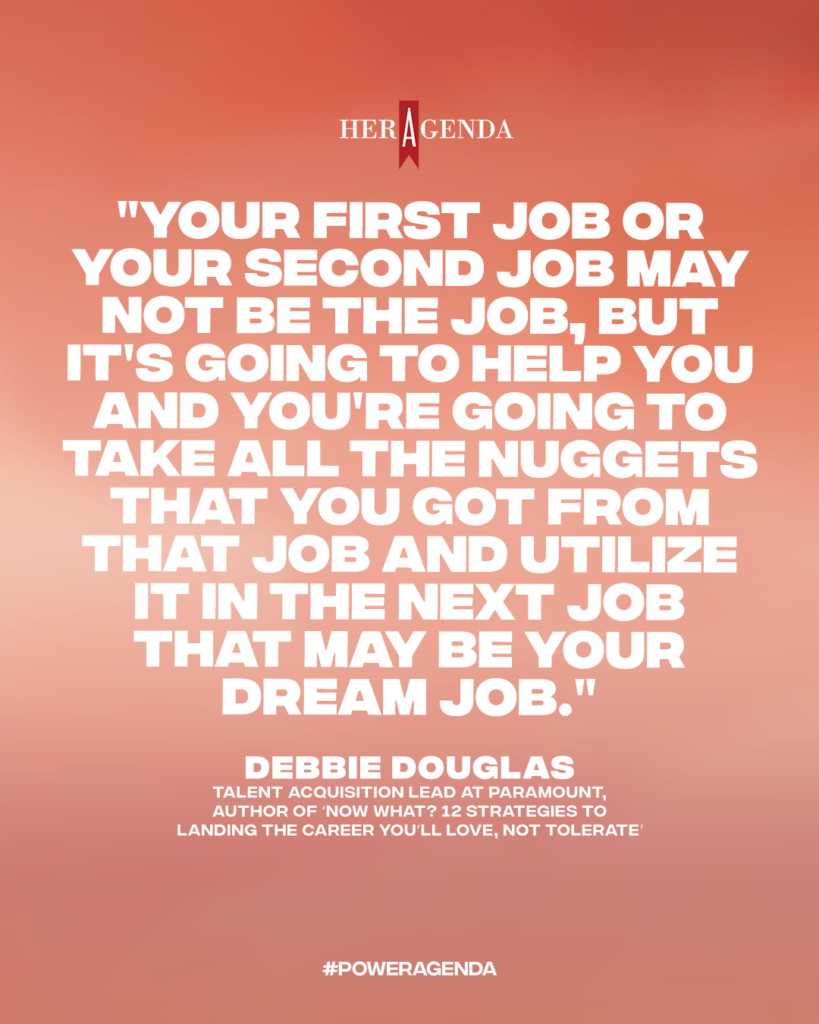
Her Agenda: Absolutely. I appreciate that advice. This is the advice that I wish someone had given to me because again, like you said, you know, you graduate from college, it’s like, I’m going to be a marketing manager and like a CMO and it’s like, not today.
Debbie Douglas: Exactly. And then also connect with those that you aspire to be in terms of roles.People love to talk about themselves.
You can connect with folks, whether it be on LinkedIn or Instagram, or whatever platform or through a professional networking organization.Those are great ways to cultivate relationships. Relationships and networking and I say networking, not in the traditional formal sense. Yes, we have that as well. Whether you’re in corporate America, you’re going to have to do that. But networking doesn’t have to be as daunting as it seems. It could be as simple as a hello, how are you doing? I noticed you do X and these are some things that I have learned about that area that make me intrigued I’d love to learn about your journey. Those are some ways that you can get closer to the industry by connecting with people who are in the industry and the roles that you’re looking for.
I would definitely say joining organizations that are near to those areas or industries that you’re interested in, those go a long way, networking and just kind of mixing and mingling with the right people, whether it be online or in-person.
They still have a lot of online stuff so it’s great. I feel like we’re in the world where it’s a nice perfect blend where you have a lot of online activity but you also can still step back outside and do some in-person networking because we still need to flex those muscles and feel comfortable with interacting with people in person as well. We can’t shy away from that. That’s important.
Her Agenda: Something else that comes up for me in the whole networking scheme of things is asking for a referral. Networking is already a bit uncomfortable to people, so then on top of that, there are often times when people want to reach out and want a referral. I know just the baseline etiquette is if you don’t know someone, they probably can’t refer you because they have to be able to speak on behalf of you. But talk about the process of developing a relationship in hopes that someone will give you a referral. Is that a real thing?
Debbie Douglas: Absolutely. It’s a real thing. I mean, if you’re strategic about your career and owning your career steps and positioning yourself the right way. Yeah, you’re going to cultivate relationships hopefully organically and authentically though. Because people can typically see whether you’re only reaching out because you need something versus you sharing something like, hey, you know, I realize your company was in the news doing X and that’s interesting, or sharing an article with them about a particular thing that happened that may relate to that industry or that person.
It shows that you have a vested interest in what’s going on, whether it be following the trends or anything of that nature.
Overall networking with the right people starts with your inner circle. When I say inner circle, it could be the people that you work with day to day to help you gather along your extended network because they can introduce you to other people who can help you along the way as well. They cultivate the teams that you are currently working with and the departments that you work with. If you work across departments, connect with those people as well, especially if you are currently on the job hunt. If you’re not currently working, reach out to people that you have worked with in the past. You gotta start with your network that you’re familiar with.
If you’re currently in a situation where you’re not ready to look for a job yet, but it may be in the next year or so, start to cultivate those relationships. Hey, let’s go to lunch or let’s have coffee and let’s just talk. Those organic conversations sometimes lead to a possible mentor or a possible advocate or a sponsor.
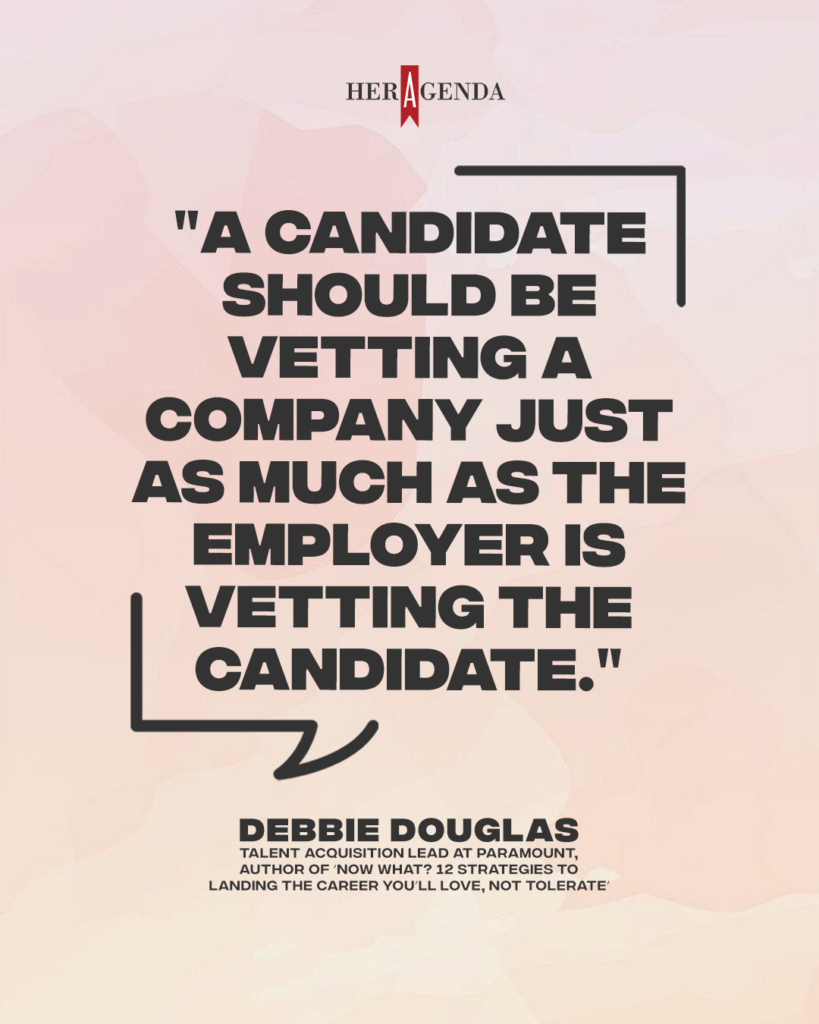
Her Agenda: So, coming up on my last question, one of the things that I felt like, which is probably the worst question to end on is more about the tolerating side of things. And so, we kind of talked about this but what are tips you could give someone today that’s in a job that they are tolerating in hopes that they’re going to move.
Debbie Douglas: l would say one is to do a little bit of self-inventory. Check in with yourself to see if it’s you, is it the job, is it the industry? Is it time for you to go and leave that industry or that job? Because it’s not satisfying you, your skills aren’t either cut out for that particular position or you’re burnt out and you’ve reached your ceiling in that area. You have to ask yourself those questions.
What’s the why? Why are you tolerating this job? Once you’ve found out that then you can start to position and strategize around what’s the next step for you and how you’re going to go about it. Are you going to maybe have a conversation with your boss? If you’re not happy, maybe you feel like you haven’t been promoted or seeing what are the avenues, what are things that maybe I’m not doing that? I can improve on that can get me to the next step maybe they’ll be realistic about you. Let’s start looking for opportunities.
Let’s start positioning ourselves to be on the market as a competitive candidate. Make sure that your resume is updated, and make sure that your LinkedIn is updated and interactive. It’s the way that you come alive to people. Recruiters are always on LinkedIn.
We should give ourselves a chance to live fully, both personally and professionally. I cannot say that enough. I need to be happy. I don’t need to be right. I don’t need to be the first. I don’t need to be the most paid, but I need to be happy. I need to have peace of mind. I need to enjoy what I do. It needs to bring me some level of joy and overall satisfaction. Don’t chase titles, don’t chase the money solely because you want to get money. I want to be successful. I want to do the nice things because I do the nice things and I want to continue doing those nice things, but I want to do it in a way where the things that pay me again, I enjoy it.
I don’t want you to get stuck in a job because it’s harder to pivot than it is to get in on the ground level as an entry-level person. It’s just going to be a little bit more challenging and you have to give up some things. There’s going to be some pros, there’s going to be some cons. You may have to start as a more junior person. You may have to take a pay cut. You may have to start honing in on those resources that you’ve been holding on to, to get you through that pivot process, but it can be done. I took a very, very tough risk with a mortgage and a car note to pay for, but what I was not going to was stay in a position that doesn’t feed me that, that isn’t protecting my peace of mind. That is critical, that’s like a no-tolerance zone for me and I want that to be for everyone.
[Editor’s note: This interview has been edited for length and clarity.]

